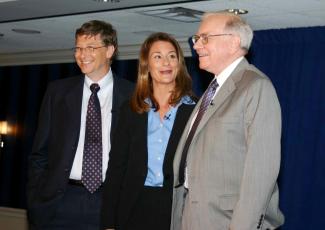Our view
Dangerous generosity

Indeed, the mega-rich of many countries are increasingly interested in philanthropy. Their charitable giving is being done in a professionalised, business-minded way, so extremely prosperous individuals are gaining ever more influence in public life. Sometimes, they remote control policymaking by pledging to co-fund government programmes.
To some extent, they are stepping in where state agencies are failing. While this is certainly helpful in the short run, it is worrisome in the long run. The public good must not be left to private individuals’ good intentions, and it is not up to them to define the public good. Doing that is the job of elected legislators and governments, who are responsible to all people, not just to the most prosperous. Philanthropists have agendas of their own, and they can be driven by ideological, religious or business preferences.
Private donors can actually do serious harm. The Turkish government believes that Fethullah Gülen, who runs Muslim schools and other charitable institutions, was the mastermind of an attempted military coup. In the USA, the American Enterprise Institute, which is sponsored by plutocrats, has an agenda of denying climate change and demanding tax cuts. Low taxes, however, are one reason why many state agencies are unable to do their jobs properly. Of course, state agencies fail for other reasons too. Corruption, nepotism, negligence and underdeveloped capacities all matter. Dysfunctional government agencies would certainly do well to learn some private-sector lessons. And yes, it makes sense when top managers assume corporate social responsibility. Private donors are welcome to contribute to public debate and to fund relevant measures. The goal, however, must be to ensure capable and democratically legitimate governments. In the same sense, multilateral agencies’ capacity to act must not depend on private donations either.
Let’s not forget that some of the super-rich did not accumulate their massive wealth in a benign way. Gates himself is an example. Microsoft, the corporation he founded, enjoyed something of a global monopoly at the end of the last century only because IBM had run into antitrust problems and was forbidden to use a disc-operating software of its own. Microsoft filled that niche and was soon the target of antitrust-proceedings itself. At the turn of the century, Gates had the reputation of a greedy monopolist. He only became a philanthropist later.
Mark Zuckerberg, the founder of Facebook, is another incredibly successful person. His and his wife’s fortune is estimated to be worth about $ 40 billion. They have pledged to donate 99 % of that money in their lifetime. Zuckerberg owes his wealth to a social-media platform that mines users’ private data and has turned out to be an important launch-pad for fake news. The entrepreneur says he wants to help to build communities, but the platform he created pays very little taxes and contributes to undermining democracy. Humankind needs him to focus on making Facebook a transparent and trustworthy forum rather than maximising its profits and promising to donate to worthy causes later.














